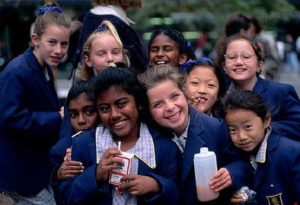Australia integrating migrant students well – OECD
 Australia is doing a good job of integrating migrant children into its education system, a new OECD report says.
Australia is doing a good job of integrating migrant children into its education system, a new OECD report says.
Migrant children, particularly those from India, China and the Philippines, are achieving better academic results than their Australian-born classmates, the report says.
Titled ‘Resilience of Students with an Immigrant Background’, the report also shows students who have recently settled into the country have more ambitious career aspirations and a strong sense of belonging at school.
In the report, Australia ranked 7th out of 64 nations assessed, based on the academic performance of migrant students – ahead of New Zealand, Britain and the United States.
The report also found children from certain migrant groups performed better than others.
Those from China, India and the Philippines significantly outperformed their Australia-born classmates while those from New Zealand and the United Kingdom were less likely to reach baseline standards.
Migrant students are also 11 per cent more likely to have ambitious career expectations to become managers, professionals or technicians.
CEO of migrant and refugee settlement agency AMES Australia Cath Scarth said the report showed the positive impact migrants have on Australian society.
“From our work with migrants and refugees, we know that newcomers to Australia are keen to contribute to Australia. And findings of this report are reflected in the other areas of our economy and society,” Ms Scarth said.
“Overwhelmingly, migrants are very determined to succeed and to fit in and very determined to make the most of the opportunities that they have from the great education system that Australia provides,” she said.
The report found that in a measurement of the ability to “attain baseline levels of academic proficiency”, 73.49 per cent of migrant students in Australia were academically resilient. The OECD average is 53.86 per cent.
It found that immigrant students in Australia also have significantly higher levels of motivational and emotional resilience compared to students migrating to other countries.
Migrant students in majority of OECD countries fail to perform as well as locally-born students. But the reverse is true in Australia with migrant students outperforming locally-born students in motivation and resilience scores – and also in Year 12 results.
The report says students’ results vary depending on their country of origin.
In Finland, Somali students are 46 per cent less likely to be academically resilient compared to students from the Russian Federation, it says.
In Australia, students from China and India are more successful in achieving results than students from Vietnam, the report says.
“Socio-economic disadvantage and language barriers are two of the greatest obstacles to the successful integration of students with an immigrant background, the report says.
It says a fifth of the difference between migrant and non-migrant student success levels is due to socio-economic status.
And migrants in OECD countries who don’t speak the language school lessons are taught in at home are eight per cent less likely to be academically resilient than native speakers.
“Education systems, schools and teachers can play a significant role in helping students with an immigrant background integrate into their communities, overcome adversity and build on their academic, social, emotional and motivational resilience,” the report says.
“Introducing early assessment of language and other skills, providing targeted language training, building a diversity-aware teaching force that can support all learners, offering additional support to disadvantaged students and schools, implementing effective anti-bullying programmes, ensuring the availability of and participation in extracurricular activities, and engaging parents can improve the well of students form an immigrant background, in all its facets,” it says.
Laurie Nowell
AMES Australia Senior Journalist












